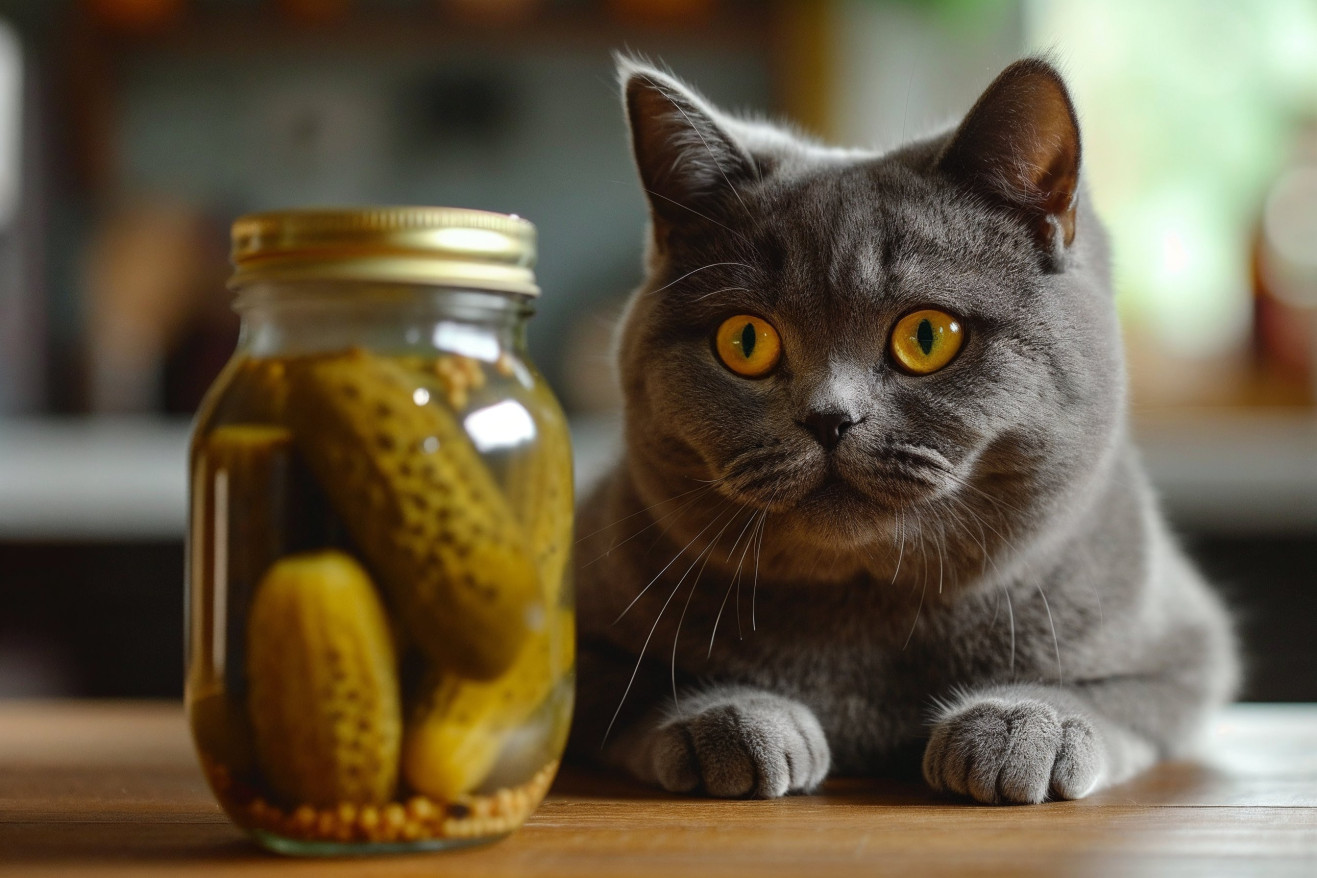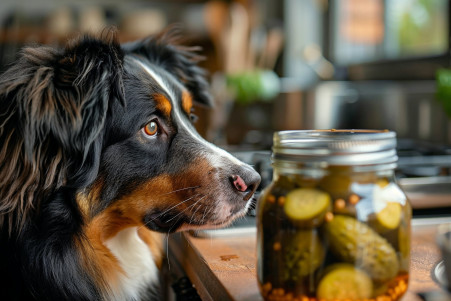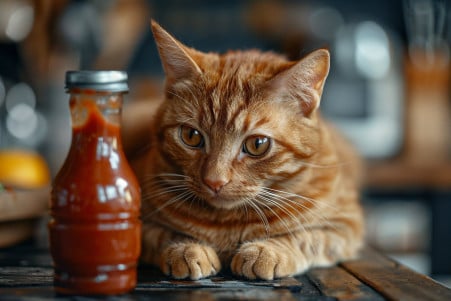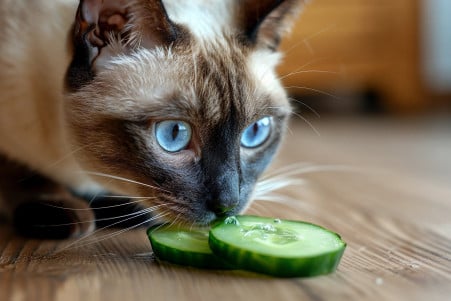Can Cats Eat Pickles? Understanding the Risks and Safety
4 February 2024

Pickles are a popular condiment that can add a zesty crunch to many of our favorite dishes, but can our cats enjoy them too? Cats cannot eat pickles because of their high sodium content, which can lead to salt poisoning, and the presence of ingredients like garlic, which are poisonous to cats. While the occasional small bite is unlikely to cause harm, regular consumption can have serious consequences.
In this article, we will explore the most recent veterinary studies and nutritional recommendations to explain why pickles are not good for cats. We will also look at research that explains the impact of sodium and potentially harmful ingredients found in pickles, and we will discuss the basic nutritional requirements of cats. This information will give you a well-rounded view of what makes a diet safe and healthy for your cat.
Can cats eat pickles?
The Dangers of High Sodium in Pickles for Cats
Although pickles may seem like a harmless snack, the high sodium content in pickles poses a real danger to cats. Too much sodium can cause hypernatremia, an electrolyte imbalance that can lead to a number of issues including high blood pressure, thirst, seizures, and even coma.
A study on PubMed even found that a high sodium diet can lead to increased water intake and urine output, which could be helpful for lower urinary tract diseases in cats. However, the study also found that this could lead to negative effects on the kidneys of cats, showing the need for careful sodium control.
PetMD lists the symptoms of salt poisoning and high blood pressure, which include disorientation and seizures, showing that it’s important to monitor the sodium intake of cats. This is especially important since cats are more sensitive to sodium than humans and can have a more severe reaction to it.
The study Effects of Dietary Sodium Chloride on Health Parameters in Mature Cats even found that although mature cats may not show immediate negative effects from an increased salt intake, it’s important to remember the difference in sodium tolerance between humans and cats when considering their diet.
In order to make sure that we’re keeping our cats safe and healthy, it’s important to understand the dangers of high sodium foods like pickles and make sure that we’re making informed decisions that will help our cats in the long run.
Dangerous Ingredients in Pickles for Cats
While a small amount of pickle may not be toxic to cats, some of the ingredients commonly found in pickles can be extremely dangerous. Garlic and onions, which are often used to flavor pickles, are both highly toxic to cats.
Garlic toxicity in cats can occur with as little as 1 gram per 5 pounds of body weight, and it can cause symptoms ranging from gastrointestinal upset to more serious issues like anemia and organ damage, says Hepper.
In addition, pickles can contain preservatives that are toxic to cats. A piece by Spot warns against the use of artificial preservatives like BHT, BHA, and Ethoxyquin, which can lead to allergic reactions, digestive problems, and other more serious long-term health problems.
While manufacturers may use these preservatives to extend the shelf life of their products, they should not be used in quantities that are safe for human consumption, such as in pickles, because they are not safe for cats.
If your cat has consumed a pickle that contains these toxic ingredients, you should take them to the vet immediately. In the meantime, watch for any signs of distress in your cat, such as vomiting or lethargy.
It’s important to keep in mind as we work to protect our pets’ health that their nutritional needs are very different from our own. Feeding your cat a high-quality cat food is the best way to ensure that they get the nutrition they need, which makes pickles and other human foods unnecessary and potentially dangerous for your cat.
Understanding the Cat Diet
While pickles may be a tasty treat for humans, they are not part of a cat’s natural diet. Cats are obligate carnivores, which means they have evolved to get their nutritional needs met by consuming animal tissue, not plant-based foods like pickles.
VCA Animal Hospitals explains that cats need certain nutrients, like essential fatty acids, minerals, and vitamins, that are only found in meat. This also includes taurine, an amino acid that is essential for cats and not found in pickles.
According to PetMD, a healthy diet for cats includes proteins, fats, and water, and is low in carbohydrates. Pickles do not meet any of these requirements, and they also expose cats to high levels of sodium and potentially harmful preservatives. In addition, Countryside Veterinary Clinic notes that cats have different nutritional needs at different stages of life, and pickles do not meet any of these needs.
In short, pickles do not meet the nutritional needs outlined by a cat’s natural diet, and they leave a lot of nutritional gaps. As a result, it’s best to feed your cat a high-quality commercial cat food that meets their carnivorous nutritional needs and ensures they get all the nutrients they need to be healthy and strong.
Healthy Bites: The Best Healthy Snacks for Your Cat
While cats can’t eat pickles, there are plenty of other healthy snacks that are designed to meet their carnivorous needs. The University of Missouri Small Animal Clinical Nutrition Service recommends that no more than 10% of a cat’s daily caloric intake come from treats to ensure a well-rounded diet. Small amounts of cooked lean meats like chicken, turkey, or beef (with no fat or seasoning) can be tasty treats that also offer important nutrients.
The Purina Institute explains that essential nutrients like taurine and arginine, which are only found in animal tissues, are critical for cats. For example, if you give your cat a small piece of cooked fish, it can enjoy a healthy treat that can help support heart and eye health because of the amino acids and omega-3 fatty acids it contains.
That said, it’s important to make sure you’re giving these treats in a responsible way.
Daily Paws notes that there are some human foods that cats can eat in moderation.
For example, cooked carrots or asparagus tips are low-calorie options that can be given as an occasional treat. However, it’s always important to check with your vet before giving your cat any new human foods to make sure they are safe for your cat’s unique dietary needs and to make sure there are no ingredients that could be toxic. By being selective with the treats you give your cat, you can make sure you’re giving them treats that they’ll enjoy while also supporting their health.
How to Make Sense of the Dietary Do’s and Don’ts for Cats: A Word of Caution
In summary, it’s not a good idea to give cats pickles. The high salt content and toxic ingredients like garlic in pickles can lead to salt poisoning and garlic toxicity in cats, which can result in vomiting, diarrhea, and in the worst-case scenario, seizures or coma. Both Modern Vet and CatTime have also pointed out that pickles can lead to health issues in cats, including high blood pressure and organ damage.
We need to respect cats’ unique dietary requirements. As obligate carnivores, cats need a diet that’s high in animal proteins and essential nutrients, which pickles don’t provide. As pet parents, it’s our responsibility to make sure we’re making informed decisions about what we feed our cats and to steer clear of human foods that can be harmful to their sensitive digestive systems.
Always talk to your vet before you add new foods to your cat’s diet. We want to make sure we’re giving our pets the best possible care, and that includes making sure they have a diet that’s satisfying, nutritious, and safe and meets their unique needs so they can live long, healthy lives.


